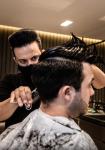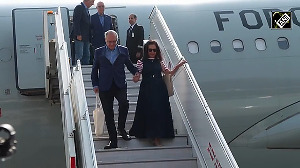The Tour de France was stripped of three of its biggest names on Friday after Jan Ullrich, Ivan Basso and Francisco Mancebo were named in a doping investigation in Spain.
German Ullrich, who won the Tour in 1997, Spaniard Oscar Sevilla and Belgian team manager Rudy Pevenage were banned after their German T-Mobile team were notified by race organisers ASO (Amaury Sport Organisation) of their naming in the probe.
The CSC team withdrew Italy's Basso, winner of the Giro d'Italia race in May, after Tour director Christian Prudhomme said all 21 teams had decided unanimously to ban those named in the investigation from the race which starts on Saturday.
The AG2R team followed suit by withdrawing Spain's Mancebo. Basso finished second in last year's Tour behind American Lance Armstrong, now retired. Ullrich was third and Mancebo fourth.
"It is difficult for us to believe what is happening," said CSC team manager Bjarne Riis, a surprising Tour de France winner in 1996 ahead of Ullrich. "It's a huge blow for everybody.
"We did what we had to do in a situation like that. It's not about pressure, it's about being responsible."
The doping scandal erupted last month after the Spanish Civil Guard raided a number of addresses to find large quantities of anabolic steroids, laboratory equipment used for blood transfusions and more than 100 packs of frozen blood.
Earlier on Friday, ASO announced it was in possession of a list of more than 50 riders involved in the probe after being handed a 37-page document by the Spanish Cycling Federation.
On Monday, Ullrich and Pevenage had issued strong denials about their involvement in possibly the biggest doping scandal in cycling since the Festina affair in 1998.
"At first we had no reason to doubt the riders's statements. Therefore we couldn't make any decision merely based on speculations, rumours and guesses", said Christian Frommert, director of sports communication for T-Mobile International.
"This situation has now changed profoundly. Accordingly we will now live up to our responsibility towards making cycling a clean sport."
SPANISH LIST
Tour organisers congratulated T-Mobile on their bravery in tackling doping, which has dogged cycling for years.
"I think this is normal. I think it is a brave move and a good example sent to the other sport directors. Today, we can do only one thing: be brave," Tour de France director Jean-Marie Leblanc said in an interview to be published later on Friday by French daily Le Monde.
T-Mobile said Ullrich and Sevilla would be replaced in the Tour by German Stephan Schreck and Italian Lorenzo Bernucci.
However, Prudhomme said Ullrich and Sevilla could not be replaced.
Doctor Eufemiano Fuentes, who has worked with a number of cycling teams, and Jose Luis Merino, the head of a clinical analysis laboratory, were released on bail after being questioned by Spanish police.
"There was clearly contact between the Spanish doctor and Jan Ullrich, Oscar Sevilla and Rudy Pevenage, which all three had previously ruled out as having taken place," T-Mobile media spokesman Stefan Wagner told German television on Friday.
"There was concrete evidence that (what Ullrich, Sevilla and Pevenage said about contacts with the doctor) was not the truth."
The assistant director of the Comunidad Valenciana team Jose Ignacio Labarta and the sporting director of the former Liberty Seguros team Manolo Saiz were also detained for questioning by Spanish police and then released.
Both men have since left their posts. Insurance giants Liberty Seguros withdrew their sponsorship of the team who have now changed their name to Astana-Wuerth.
Comunidad Valenciana have had their invitation to take part in the Tour withdrawn.
But Astana-Wuerth, Kazakhstan rider Alexander Vinokourov's team, have been allowed to participate after appealing to the Court of Arbitration for Sport in Lausanne.
In 1998, Festina were kicked out of the Tour following the discovery of a large supply of drugs in a car belonging to the team. Top rider Richard Virenque was banned for nine months.
Robert Heras, who won the Tour of Spain stage race last year, was banned for two years in November after testing positive for the banned blood-boosting substance EPO.
Increasing the number of oxygen-carrying red cells in blood delays the onset of fatigue in endurance races and manipulating riders' blood is rumoured to have been used in cycling for decades.







